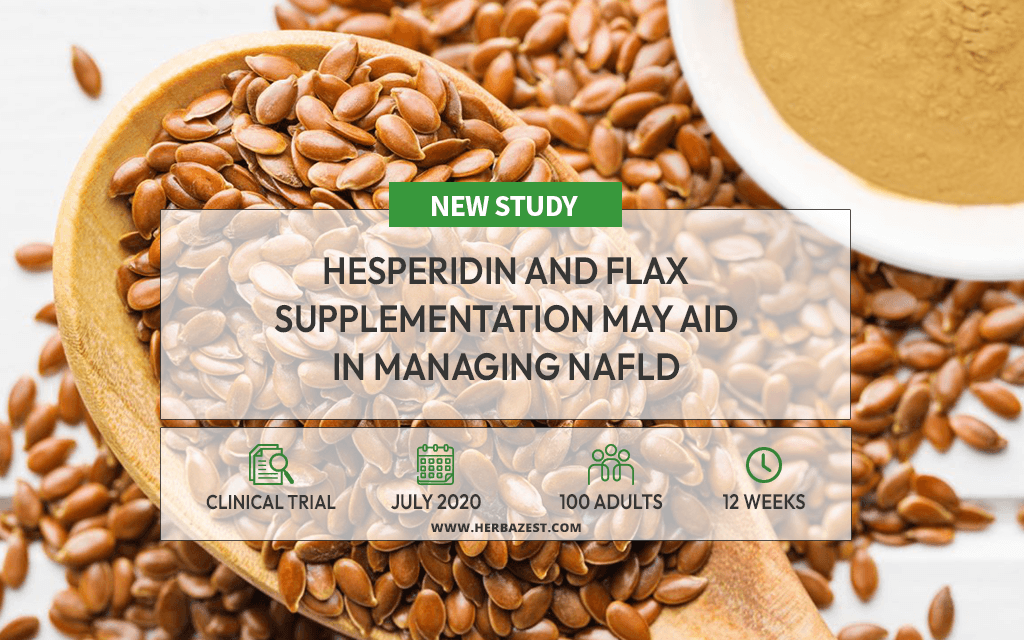Non-alcoholic fatty liver disease (NAFLD) is recognized as a major health concern globally. Its prevalence has been rising in parallel with the increasing rates of obesity, type 2 diabetes, and metabolic syndrome. Even though NAFLD is said to affect 25% of the global population, there remains a dearth of approved pharmacological treatments.1
In light of this, researchers have turned their attention to dietary interventions as potential therapeutic avenues. One such avenue under scrutiny is the use of flaxseed and hesperidin (a flavonoid found in citrus fruits), both renowned for their purported health benefits.2,3 A recent clinical trial aimed to evaluate the clinical effects of flaxseed and hesperidin in patients with NAFLD.
The Study
This randomized, controlled clinical trial involved 100 adults diagnosed with NAFLD. These patients were randomly assigned to one of four dietary intervention groups:
- Control group receiving lifestyle modification alone
- Intervention group 1 receiving lifestyle modification with flaxseed supplementation
- Intervention group 2 receiving hesperidin supplementation
- Intervention group 3 receiving a combination of flaxseed and hesperidin supplementation
Participants were advised to make lifestyle changes, including dietary modifications and aerobic exercise, as per standardized recommendations, without additional weight loss regimens. The recommended diet consisted of specific nutrient distributions in relation to daily caloric intake, emphasizing low fat, moderate protein, high carbohydrate, limited cholesterol, and fiber intake.
The interventions spanned a duration of 12 weeks, during which various parameters including anthropometric measurements, metabolic profiles, inflammatory biomarkers, and hepatic steatosis and fibrosis were assessed. The findings were published in the European Journal of Clinical Nutrition.
The Results
Following the study period, notable improvements were observed across all intervention groups. Reductions in body mass index, glucose homeostasis parameters, and hepatic steatosis were significant.
Researchers also observed that the intervention groups experienced significant decreases in plasma levels of alanine aminotransferase, indices of insulin resistance and sensitivity, fasting glucose, and fatty liver index compared to the control group. These parameters are particularly important in people with NAFLD because the disease is closely linked to insulin resistance, obesity, and other metabolic issues.
Many of the observed improvements were particularly substantial when combining flaxseed and hesperidin compared to these treatments alone.
What Does this Mean?
This study provides compelling evidence supporting the potential therapeutic efficacy of hesperidin and flaxseed supplementation in patients with NAFLD. The observed improvements in glucose and lipid metabolism, coupled with reductions in inflammation and hepatic steatosis, underscore the promise of these dietary interventions.
Particularly noteworthy were the synergistic effects observed with the combination of flaxseed and hesperidin, especially in ameliorating plasma glucose concentration and insulin resistance. These findings offer hope for the development of novel dietary strategies in the management of NAFLD, potentially offering a safe and accessible adjunct to existing treatment modalities.
Other herbs that may be beneficial for people with NAFLD include artichokes, garlic, beans, and leafy greens like spinach.
Sources
- European Journal of Clinical Nutrition, The efficacy of flaxseed and hesperidin on non-alcoholic fatty liver disease: an open-labeled randomized controlled trial, 2020
Footnotes:
- Transplantation. 2019). Epidemiology of Nonalcoholic Fatty liver Disease and Nonalcoholic Steatohepatitis: Implications for Liver Transplantation. Retrieved June 7, 2024, from https://journals.lww.com/transplantjournal/fulltext/2019/01000/epidemiology_of_nonalcoholic_fatty_liver_disease.11.aspx
- Phytotherapy Research. (2019). Hesperidin improves hepatic steatosis, hepatic enzymes, and metabolic and inflammatory parameters in patients with nonalcoholic fatty liver disease: A randomized, placebo-controlled, double-blind clinical trial. Retrieved June 7, 2024, from https://pubmed.ncbi.nlm.nih.gov/31264313/
- International Journal of Food Sciences and Nutrition. (2016). Flaxseed supplementation in non-alcoholic fatty liver disease: a pilot randomized, open labeled, controlled study. Retrieved June 7, 2024, from https://pubmed.ncbi.nlm.nih.gov/26983396/




